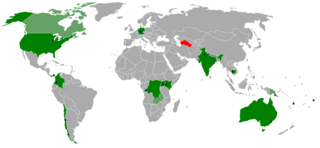
A Bahá'í House of Worship, also referred to by the name of Mashriqu-l-Adhkár, an Arabic phrase meaning "Dawning-place of the remembrances of God", is the designation of a place of worship, or temple, of the Bahá'í Faith. The teachings of the religion envisage Houses of Worship being surrounded by a number of dependencies dedicated to social, humanitarian, educational, and scientific pursuits, although none has yet been built to such an extent.
The Bahá'í administration or Bahá'í administrative order is the administrative system of the Bahá'í Faith. It is split into two parts, the elected and the appointed. The supreme governing institution of the Bahá'í Faith is the Universal House of Justice, situated in Haifa, Israel.
One of the fundamental teachings of the Bahá'í Faith is that men and women are equal, and that equality of the sexes is a spiritual and moral standard that is essential for the unification of the planet and the unfoldment of peace. Bahá'í teachings note the importance of implementing this principle in individual, family, and community life. Nevertheless, the Bahá'í notion of the full spiritual and social equality of the two sexes does not imply sameness, so that gender distinction and differentiation are observed in certain areas of life. For example, while women can and do serve in an extensive range of elected and appointed positions within the faith at both national and international levels, they are not permitted to serve as members of the Universal House of Justice, the supreme governing institution of the Bahá'í Faith. Furthermore, the education of daughters is held to be more important than, and therefore to take precedence over, that of sons.
The Ruhi Institute is an educational institution, initially operating under the guidance of the National Spiritual Assembly of the Bahá'í Faith in Colombia.
The Custodians is terminology in the Bahá'í Faith, which refers to nine Hands of the Cause assigned specifically to work at the Bahá'í World Centre to assist Shoghi Effendi as head of the religion, referred to as Guardian. After his death they were chosen by secret ballot, with all living Hands of the Cause voting.
Religion in Colombia is dominated by various forms of Christianity and is an expression of the different cultural heritages in the Colombian culture including the Spanish colonization, the Native Amerindian and the Afro-Colombian, among others.
Farzam Arbab was a member of the Universal House of Justice, the supreme governing institution of the Bahá'í Faith, from 1993 and until he relinquished his membership in 2013, at the age of 71. He introduced the Ruhi institute and other core activities to the world community.
Paul Lample is a current member of the Universal House of Justice, the supreme governing institution of the Bahá'í Faith. He and Payman Mohajer were both elected during a by-election in 2005 to fill the vacancies created by the retirement of Ian Semple and Douglas Martin.
Payman Mohajer is a current member of the Universal House of Justice, the supreme governing institution of the Bahá'í Faith. He and Paul Lample were both elected during a by-election in 2005 to fill the vacancies created by the retirement of Ian Semple and Douglas Martin.
Alí-Yulláh Nakhjavání served as a member of the Universal House of Justice, the supreme governing body of the Bahá'í Faith, between 1963 and 2003.
The Bahá'í Faith in Nepal begins after a Nepalese leader encountered the religion in his travels before World War II. Following World War II, the first known Bahá'í to entire Nepal was about 1952 in the person N. P. Sinha who moved to Birganj and the first Nepalese Bahá'í Local Spiritual Assembly elected in 1959, and its National Assembly in 1972. For a period of time, between 1976 and 1981, all assemblies were dissolved due to legal restrictions. The 2001 census reported 1211 Bahá'ís, and since the 1990s the Bahá'í community of Nepal has been involved in a number of interfaith organizations including the Inter-religious Council of Nepal promoting peace in the country. The Association of Religion Data Archives estimated some 4300 Bahá'ís in 2005.

Since its inception the Bahá'í Faith has had involvement in socioeconomic development beginning by giving greater freedom to women, promulgating the promotion of female education as a priority concern, and that involvement was given practical expression by creating schools, agricultural coops, and clinics. Current development activities worldwide are related to areas such as education, health, agriculture, arts and media, the local economy and the advancement of women. By 2017 there were an estimated 40,000 small scale projects, 1,400 sustained projects, and 135 Bahá'í inspired organizations.
The Bahá'í Faith and Native Americans has a history reaching back to the lifetime of `Abdu'l-Bahá and has multiplied its relationships across the Americas. Individuals have joined the religion and institutions have been founded to serve Native Americans and conversely have Native Americans serve on Bahá'í institutions.
The Bahá'í Faith in Colombia begins with references to the country in Bahá'í literature as early as 1916, with Bahá'ís visiting as early as 1927. The first Colombian joined the religion in 1929 and the first Bahá'í Local Spiritual Assembly was elected in Bogotá in 1944 with the beginning of the arrival of coordinated pioneers from the United States and achieved an independent National Spiritual Assembly in 1961. By 1963 there were eleven local assemblies. In the 1980s institutions were developed in Colombia that have influenced activities inside and independent of the religion in other countries: FUNDAEC and the Ruhi Institute. The Association of Religion Data Archives estimated some 70,000 Bahá'ís in 2005, and about the same in 2010.
The Bahá'í Faith in Mongolia dates back only to the 1980s and 1990s, as prior to that point Mongolia's Communist anti-religious stance impeded the spread of the religion to that country. The first Bahá'í arrived in Mongolia in 1988, and the religion established a foothold there, later establishing a Local Spiritual Assembly in that nation. In 1994, the Bahá’ís elected their first National Spiritual Assembly. Though the Association of Religion Data Archives estimated only some 50 Bahá'ís in 2005 more than 1,700 Mongolian Bahá'ís turned out for a regional conference in 2009.
The Bahá'í Faith is a diverse and widespread religion founded by Bahá'u'lláh in the 19th century in Iran. Bahá'í sources usually estimate the worldwide Bahá'í population to be above 5 million. Most encyclopedias and similar sources estimate between 5 and 6 million Bahá'ís in the world in the early 21st century. The religion is almost entirely contained in a single, organized, hierarchical community, but the Bahá'í population is spread out into almost every country and ethnicity in the world, being recognized as the second-most geographically widespread religion after Christianity. See Bahá'í statistics.
Kiser Barnes is a lawyer and educator who has served in various positions within the hierarchy of the Bahá’í Administrative Order, including service on the Universal House of Justice, the supreme governing body of the Bahá'í Faith, from 2000 through 2013.




